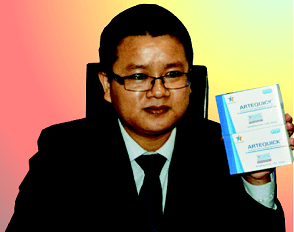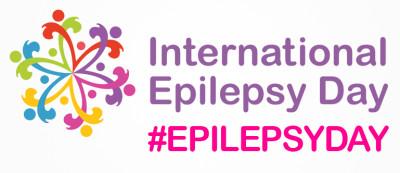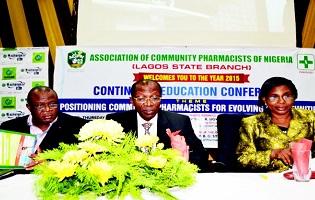Poised to reduce the global burden of cancer, which kills about thrice the number of people who die of tuberculosis, HIV and malaria combined, the Union for International Cancer Control (UICC), founded World Cancer Day (WCD), on February 4 , 2008, to raise awareness and as well as generate support for people living with the disease.
Consequently, WCD has been commemorated worldwide on February 4, but the impact of this celebration is yet to be felt as the prevalence of the terminal disease swells from year to year, and from border to border, as it keeps claiming the lives of its victims, both rich and poor alike.
One major issue that has been generally identified as a setback in the fight against cancer is inadequate medical facilities for the screening and treatment of the condition, in the country, as well as late presentation of patients to the hospitals.
This is why this year’s theme is centred on deliberate actions on the part of government, corporate bodies and individuals, in reducing the disease burden in the country. The theme for this year’s WCD: “We can. I can.”—will last from 2016 through to 2018.
This implies that we can: inspire action; take action; prevent cancer; challenge perceptions; create healthy environments; improve access to cancer care; build a quality cancer workforce; mobilize our networks to drive progress; shape policy change; make the case for investing in cancer control; and work together for increased impact.
This deliberate concerted effort is imperative because, according to the World Health Organisation (WHO), more than 70 per cent of cancer deaths occur in low- and middle-income countries. Although the risk of developing or dying from it is still higher in the developed world, still, early detection and prompt medical attention are key in its management.
According to the Medical Director, Pfizer Pharmaceutical Company, Dr Kodjo Soroh, cancer is on the rise, not only in Nigeria, but worldwide. As a result, doctors are still researching into its cure.
“The unfortunate aspect of cancer situation in Nigeria is not that doctors cannot treat it, but the cost of treatment and availability of medical equipment is grossly inadequate. Nigeria is not prepared for the Tsunami that is about to break in cancer. I did a little survey in the northwest of the country some two years ago. It was recorded in a teaching hospital that 30 new cases are reported every day. Cancer is killing Nigerians everyday. The rate at which cancer is killing Nigerians is alarming. It is more than cases of deaths caused by malaria AIDS and Tuberculosis.
“The best way to get an idea on the prevalence is to go by the WHO statistics on cancer situation in Nigeria. The statistics is alarming. It says per hour, 30 Nigerians are dying of cancer. I say Nigeria is not prepared because, if you look at our National Health Insurance Scheme (NHIS) cancer is not covered. So, if you develop cancer now, you are on your own. How many radiotherapy units do you have in Nigeria and the specialists, how many oncologists? Early detection and diagnosis are important. Once these are delayed, it spreads and causes more damage. If you have money to go out, then the cost is on your head.”
He continued: “The best option anybody has is to prevent it. Government should invest more on the infrastructure and health personnel. Early screening and detection are important in cancer management or its prevention. Let us create more awareness by telling our women to do self breast examination, screen for cervical cancer that is even preventable by getting vaccinated.
“Let people disabuse their minds on a misconception that if they get female teenagers immunised against cervical cancer; that they are indirectly being prepared for promiscuity. Nigerians should move on. Get our women vaccinated against cervical cancer. There are some women who have been known to keep only a man and still come down with cervical cancer because pappiloma virus is the cause of that type of cancer. The statistics even have it that more married women may have cervical cancer than the unmarried.”
Explaining the development of cancer, the Medical Director, Triumph Medical Centre, Dr Deji Morenikeji, said cancer is the abnormal growth of body tissues in the cells and can affect any part of the body. “When a person is said to have developed cancer, it simply means the cells that are normal are fast growing into abnormal cells and distorting them. There is increase of awareness on cancer now. Government is actually playing a major role in cancer detection. It has a unit in the Ministry of Health dedicated to that.
“Unfortunately, in this part of the world people go late to the hospital. The treatment is not encouraging. If cancer is detected early, depending on the type of cancer, there is a five-year survival rate, and the rate is higher and impressive. Cancer drugs and treatments are expensive worldwide. Government is trying its best to contain the development of the disease, all things being equal including not having its hereditary trait, and then its prevention, that is, its development is more individualistic.
On prevention, he said: “People should be mindful of their lifestyle. They should watch what they eat as what they consume plays important role on their well-being. They should exercise more and do away with sedentary lifestyle. They should do more health assessments, routine medical examinations.”
Statistics show that there are six most common cancers in Nigeria. They include:
- Breast cancer
- Cervix cancer
- Prostate cancer
- colorectal cancer
- liver cancer and
- NHL
Breast Cancer
Breast cancer is the commonest female cancer and studies have indicated increase in the relative frequency ratio; moving from number 2 or 3 to the number one cancer in both sexes..This increase has been attributed to increase awareness and presentation for screening. Majority of breast cancers occur in pre-menopausal women with the peak age in the 5th decade.
About 80-85% still present in advance stage III with attendant poor outcome.In Nigerian studies, only 25-50% of the tumours are reported to be oestrogen/progesterone receptor positive, which is the basis for hormonal treatment.
Causes of Breast Cancer
When you’re told that you have breast cancer, it’s natural to wonder what may have caused the disease. But no one knows the exact causes of breast cancer. Doctors seldom know why one woman develops breast cancer and another doesn’t, and most women who have breast cancer will never be able to pinpoint an exact cause. What we do know is that breast cancer is always caused by damage to a cell’s DNA.
The risk factors for breast cancer
- Female gender
- increasing age
- Maternal relative with breast cancer
- Abnormal genes (BRCA 1, BRCA2 genes)
- Nulliparity
- Late age at first pregnancy and longer reproductive span(early menarche<12yrs, late menopause>50yrs).
- Others are obesity,
- Increased dietary fat & alcohol intake,
- Cigarette smoking,
- Previous breast lesion with atypical changes,
- Previous breast cancer.
Male breast cancer
In Nigeria, it represents 3.7 -8.6% of all breast cancers .This is higher than the 1% recorded from other parts of the world. The higher figures in Nigeria may be due to small sample size, since the data are mainly hospital based. The peak age incidence is 40-49years; similar to that of female cancer.Majority are invasive ductal carcinoma. It is characterized by late presentation at advanced stage with attendant poor prognosis.
A tumor is a mass of abnormal tissue. There are two types of breast cancer tumors: those that are non-cancerous, or ‘benign’, and those that are cancerous, which are ‘malignant’.
Diagnosis of Breast cancer
Breast cancer is sometimes found after symptoms appear, but many women with early breast cancer have no symptoms. This is why getting the recommended screening tests before any symptoms develop is so important.
Medical history and physical exam
If you think you have any signs or symptoms that might mean breast cancer, be sure to see your doctor as soon as possible. Your doctor will ask you questions about your symptoms, any other health problems, and possible risk factors for benign breast conditions or breast cancer.
Your breasts will be thoroughly examined for any lumps or suspicious areas and to feel their texture, size, and relationship to the skin and chest muscles. Any changes in the nipples or the skin of your breasts will be noted. The lymph nodes in your armpit and above your collarbones may be palpated (felt), because enlargement or firmness of these lymph nodes might indicate spread of breast cancer. Your doctor will also do a complete physical exam to judge your general health and whether there is any evidence of cancer that may have spread.
If breast symptoms and/or the results of your physical exam suggest breast cancer might be present, more tests will probably be done. These might include imaging tests, looking at samples of nipple discharge, or doing biopsies of suspicious areas.
Mammograms
A mammogram is an x-ray of the breast. Screening mammograms are used to look for breast disease in women who have no signs or symptoms of a breast problem. Screening mammograms usually take 2 views (x-ray pictures taken from different angles) of each breast.
For a mammogram, the breast is pressed between 2 plates to flatten and spread the tissue. This may be uncomfortable for a moment, but it is necessary to produce a good, readable mammogram. The compression only lasts a few seconds.
If your diagnostic mammogram shows that the abnormal area is more suspicious for cancer, a biopsy will be is needed to tell if it is cancer.
Even if the mammograms show no tumor, if you or your doctor can feel a lump, a biopsy is usually needed to make sure it isn’t cancer. One exception would be if an ultrasound exam finds that the lump is a simple cyst (a fluid-filled sac), which is very unlikely to be cancerous.
Magnetic resonance imaging (MRI) of the breast
MRI scans use radio waves and strong magnets instead of x-rays. The energy from the radio waves is absorbed and then released in a pattern formed by the type of body tissue and by certain diseases. A computer translates the pattern into a very detailed image. For breast MRI to look for cancer, a contrast liquid called gadolinium is injected into a vein before or during the scan to show details better.
MRI scans can take a long time − often up to an hour. For a breast MRI, you have to lie inside a narrow tube, face down on a platform specially designed for the procedure. The platform has openings for each breast that allow them to be imaged without compression. The platform contains the sensors needed to capture the MRI image. It is important to remain very still throughout the exam.
Prevention of Breast Cancer
The following tips are essential in preventing breast cancer
- Regular breast examination
- Changing lifestyle or eating habits.
- Avoiding things known to cause cancer.
- Taking medicine to treat a precancerous condition or to keep cancer from starting.
Cervical Cancer
Cervical cancer occurs when abnormal cells on the cervix grow out of control. The cervix is the lower part of the uterus that opens into the vagina. Cervical cancer can often be successfully treated when it’s found early. It is usually found at a very early stage through a Pap test.
It is the second most common cancer in Nigerian women and the most common female genital cancer constituting a major cause of mortality among Nigerian females in their most productive years. It was the commonest cancer reported from Ibadan, Eruwa, Zaria, Jos, Benin and Calabar and in the early years, second to breast in Enugu and Ife-Ijesha , as indicated by the study conducted by professor, Fatimah Abdulkareem, of the College of Medicine, University of Lagos.
Recent data shows that it has however, been overtaken by breast cancer; except in Kano where it was reported as the most common cancer in both sexes. In Jos, it is the most common female cancer.
On the other hand, incidence of other gynae cancers such as choriocarcinoma and endometrial has reduced drastically.The age range is between 17-80yrs with peak in the 5th decade.Multiple marriages, late presentation are common and majority of the patients have not had Pap smear done before.
Human papillomavirus (HPV) is a necessary cause of cervical cancer being present in 99.9% of cases. In a study of 233 cases of cervix cancer from Lagos, HPV 16 and 18 were present in 65.2%. This supports data that effective vaccination against these 2 types will reduce the cervical burden in Nigeria.
You can get HPV by having sexual contact with someone who has it. There are many types of the HPV virus. Not all types of HPV cause cervical cancer. Some of them cause genital warts, but other types may not cause any symptoms.
Most adults have been infected with HPV at some time. An infection may go away on its own. But sometimes it can cause genital warts or lead to cervical cancer. That’s why it’s important for women to have regular Pap tests. A Pap test can find changes in cervical cells before they turn into cancer. If you treat these cell changes, you may prevent cervical cancer.
Abnormal cervical cell changes rarely cause symptoms. But you may have symptoms if those cell changes grow into cervical cancer.
Symptoms of cervical cancer may include:
Bleeding from the vagina that is not normal, such as bleeding between menstrual periods, after sex, or after menopause.
Pain in the lower belly or pelvis.
Pain during sex.
Vaginal discharge that isn’t normal.
The treatment for most stages of cervical cancer includes:
Surgery, such as a hysterectomy and removal of pelvic lymph nodes with or without removal of both ovaries and fallopian tubes.
Chemotherapy.
Radiation therapy.
Prevention of cervical cancer
The Pap test is the best way to find cervical cell changes that can lead to cervical cancer. Regular Pap tests almost always show these cell changes before they turn into cancer. It’s important to follow up with your doctor after any abnormal Pap test result so you can treat abnormal cell changes. This may help prevent cervical cancer.
If you are age 26 or younger, you can get the HPV vaccine, which protects against two types of HPV that cause most cases of cervical cancer.
he virus that causes cervical cancer is spread through sexual contact. The best way to avoid getting a sexually transmitted infection is to not have sex. If you do have sex, practice safer sex, such as using condoms and limiting the number of sex partners you have.
Prostate Cancer
The prostate is a gland that is a part of the male reproductive system that wraps around the male urethra at its exit from the bladder. Common problems are BPH (Benign Prostatic Hyperplasia), acute and chronic bacterial prostatitis and chronic prostatitis (non-bacterial)
Prostate cancer is common in men over 50, especially in African-Americans and in men who eat fatty food and/or have a father or brother with prostate cancer.
It Is the most common cancer in Nigerian males; having overtaken liver cancer.It accounts for 6.1-19.5% of all cancers and incidence is increasing. Current data from most parts of the country show it to be the 3rd most common cancer, except in Calabar where a very high figure was recorded for prostate cancer as the most common in both sexes accounting for 34.7% of all cancers. Earlier report from that center between 1979-88 had recorded 28.6% of all male cancers.
Compared to African-American men, Nigerian men are 10 times more likely to have prostate cancer and 3.5 times more likely to die from it. Environmental and most importantly, genetic factors have been incriminated as the reason for the geographic differences in incidence.
Risk factors for prostate cancer include:
- race,
- age above 40years,
- positive family history,
- high fat diet and
- high serum androgens levels; the latter being most consistent.
Symptoms of prostrate Cancer
Symptoms of prostate problems (and prostate cancer) include urinary problems (little or no urine output, difficulty starting (straining) or stopping the urine stream, frequent urination, dribbling, pain or burning during urination), erectile dysfunction, painful ejaculation, blood in urine or semen and/or deep back, hip, pelvic or abdominal pain; other symptoms may include weight loss, bone pain and lower extremity swelling
Prostate cancer is definitively diagnosed by tissue biopsy; initial studies may include a rectal exam, ultrasound and PSA (prostate-specific antigen) levels
Treatments for prostate cancer may include surveillance, surgery, radiation therapy, and hormone therapy
PSA testing is considered to be yearly PSA tests; not all agree this should be done
Identify prostate problems early is a way to reduce future prostate problems
Diagnosis of prostate cancer
The diagnosis of prostate cancer mostly involves a combination of three tests:
Digital rectal examination: As part of a physical examination your doctor inserts a gloved and lubricated finger into your rectum and feels toward the front of your body. The prostate gland is a walnut or larger sized gland immediately in front of the rectum, and beneath your bladder. The back portion of prostate gland can be felt in this manner. Findings on this exam are compared to notes about the patient’s prior digital rectal examinations.
The exam is usually brief, and most find it uncomfortable due to the pressure used to adequately examine the prostate gland. Findings such as abnormal size, lumps, or nodules, may indicate prostate cancer.
This examination should be part of an annual physical in all men over 50 years of age to note changes in the prostate. In men with a family history of prostate cancer, or in African American men exams should begin at 40 years of age.
Prostate specific antigen (PSA) blood test: The PSA blood test measures the level of a protein found in the blood that is produced by the prostate gland and helps keep semen in liquid form. The PSA test can indicate an increased likelihood of prostate cancer if the PSA is at an increased or elevated level, but it does not provide a definitive diagnosis. Prostate cancer can be found in patients with a low PSA level but this occurs less than 20% of the time.
If the PSA level is elevated (levels can depend upon your age, on the size of your prostate gland on examination, certain medications you may be taking, or recent sexual activity), further testing may be needed to rule out prostate cancer.
PSA measurements are often tracked over time to look for evidence of a change. The amount of time it takes for the PSA level to increase is referred to as PSA velocity. A PSA doubling time can be also tracked in this fashion. PSA velocity and PSA doubling time can help your doctor determine whether prostate cancer may be present.
The presence of an abnormal result on digital rectal examination, or a new or progressive abnormality in a PSA test may lead to a referral to a surgeon who specializes in diseases of the urinary system (a urologist) who may perform further testing, such as a biopsy of the prostate gland.
Prostate biopsy: A biopsy refers to a procedure which involves taking of a sample from a tissue in the body. Prostate cancer is only definitively diagnosed by finding cancer cells on a biopsy sample taken from the prostate gland.
The urologist may have you stop medications such as blood thinners before the biopsy. On the day of the biopsy the doctor will apply a local anesthetic by injection or topically as a gel inside the rectum over the area of prostate gland. An ultrasound probe is then placed in the rectum. This device uses sound waves to take a picture of the prostate gland and helps guide the biopsy device. The device used is a spring-loaded needle that allows the urologist to extract cores from the prostate gland. Usually 12 cores are obtained, six from each side. Two cores are taken from the upper, middle, and lower portions of the prostate gland. The cores are submitted for analysis to a pathologist (a doctor who specializes in examining tissues to make a diagnosis). Results may take several days.
A biopsy procedure is usually uncomplicated, with just some numbness, pain, or tenderness in the area for a short time afterwards. Occasionally, a patient has some bleeding in the urine after the procedure. Rarely, the patient may develop an infection after a biopsy procedure, or be unable to urinate. The patient will be advised to call and consult a doctor if such problems occur.
Prostate cancer biopsy results
The result of the pathologist’s analysis of the biopsy cores under the microscope is the only way to diagnose prostate cancer. The biopsy procedure is not perfect, and cancer present in the prostate may be missed. If the urologist is still suspicious based on the results of the examination and the ultrasound images seen during the procedure, additional biopsies may be recommended.
The pathologist’s report on the biopsy sample showing prostate cancer will contain much detailed information. The size of the biopsy core and the percentage of involvement of each core will be reported. Most importantly the prostate cancer present will be assigned a numerical score, which is usually expressed as a sum of two numbers (for example, 3 + 4) and is referred to as the Gleason Score. This characterizes the appearance of the cancer cells and helps predict its likely level of aggressiveness in the body. It is often also referred to as the grade of the prostate cancer.
The Gleason score and the extent of involvement of the biopsy core expressed as a percentage, as well as the PSA level as well as your general state of health and otherwise estimated life expectancy all help the doctors make their best recommendations for you regarding how your cancer should be treated.
The accuracy of the PSA test
The PSA test is a tool for use by your doctor but it is not a perfect way to tell whether or not a patient has prostate cancer because is not sensitive enough to pick up all prostate cancers. It is not specific enough in that it may be elevated in people without prostate cancer, such as those whose prostate glands are infected, or just inflamed, but not cancerous. It is also elevated for several days after a digital rectal exam, or after ejaculation. Nevertheless, it accurately measures the amount of PSA in the blood at the time that it is drawn.
The interpretation of the PSA result must be done with care. PSA results must be, for example, interpreted in the context of the patient’s age. Younger men (under 70, and definitely under 60) may have either more aggressive prostate cancers, or more life to lose if not evaluated aggressively. Conversely, men over 70 often have more indolent or slow-moving prostate cancers, or other medical conditions which may be greater threats to their lives over the next 10 years than may prostate cancer, and thus less aggressive evaluation and treatment may be warranted. The test is best used to establish a pattern in a man with serial measurements obtained over years.
It is now thought that doctors probably only find the more aggressive prostate cancers. The disease is common as men age. It is estimated 16% of men will be diagnosed with prostate cancer in their lifetime and yet only 3% will die of it. Many men likely have small prostate cancers present by the time they are over 60 years of age, with estimates ranging from 30% to 40% having prostate cancer cells in their prostates. The presence of these small cancers also likely further increases with age. Most of these cancers are very slow-growing and not aggressive in their tendency to spread as they are never discovered or symptomatic during the men’s lives. Diagnosing these prostate cancers may only increase the cost and result in treatment-related complications in these men.
Talk to your doctor about the risks and benefits of having PSA testing if you are 40 years of age with a family history of prostate cancer (or age 50 if you do not have a family history), or are of African American ancestry. The test results should be considered in the context of the man’s urinary symptoms, if any, his family history, his race and ethnicity, his diet, weight, and physical findings. Further there should be attention given to the pattern of change in his serial PSA measurements.
Treatment of prostrate cancer
Treatment options for prostate cancer are many, and while this is an advantage in that prostate cancer is such a common disease in men, it can also be a cause of great confusion. The following overview presents some information about these options, but it is not a complete explanation of any of these.
Surgery
The removal of the entire prostate gland and the attached seminal vesicles is referred to as a radical prostatectomy. This is usually done through an incision or incisions made over the front of the lower abdominal wall with the procedure, taking place behind the pubic bones at the front of the pelvis (a retropubic approach). Today the main choice is between a standard open radical prostatectomy and the use of a robotic system for performance of the procedure through smaller incisions. The former allows the surgeon to feel the tissues and make the cuts themselves. The latter uses an operating system robot, which the surgeon guides. The former takes longer to recover from, and has more risk of blood loss associated with it. The latter results in a more rapid recovery and less blood loss generally.
Intact pelvic nerve bundles on either side of the prostate in the pelvis are essential for a man to be able to have an erection. Impotence — or the inability to have and sustain an erection of a quality sufficient for successful intercourse — can occur after this operation. The likelihood of impotence is primarily dependent on whether or not the necessary nerves can be preserved during surgery, AND the patient’s true preoperative ability to still have an erection. Nerve-sparing surgical technique is desirable and the surgeon should plan to do this, if possible. These important pelvic nerve bundles may need to be sacrificed if they are too close to or are involved with the cancer. The objective of the surgery is to cure the patient of the prostate cancer with the least number of problems afterward as possible, but the performance of a potentially curative procedure must remain the primary objective of the surgeon.
The radical prostatectomy involves the removal of a portion of the urethra. The urethra is the tube that runs from the bladder to the outside through the penis. It runs through the prostate gland. The procedure can disrupt the sphincter or valve, which controls urine flow from the bladder. The surgeon reconnects the urethra to the bladder after the prostate is out. The more careful and experienced the surgeon, the less the risk of long-term inability to control the flow of urine (incontinence).
The risks of an operation lasting several hours also remain substantial and include heart problems, blood loss, as well as a risk of infection, blood clots, and rarely death. Such operations are appropriate for patients whose cancer appears to be confined to the prostate gland.
Radiation therapy
Radiation therapy involves potentially curative treatment using machines that generate and administer controlled, invisible beams of energy known as radiation. This is called external beam radiation therapy (EBRT). It also can be done using radioactive sources, or seeds, implanted permanently, or higher energy sources placed temporarily into the body. This technique is called brachytherapy.
An X-ray machine uses a low energy radiation beam to take a picture of a portion of the body. Radiation therapy machines put out high energy beams that can be focused very precisely to deliver treatment to a site. The radiation does not “burn out” the cancer, but damages the cells’ DNA, which causes the cancer cells to die. This process can take some time to occur after the radiation treatments have been given.
The radiation passes directly through the tissues in EBRT. Radiation treatment used today delivers very little energy to normal tissues. It just passes through. Most of the energy is able to be focused and delivered directly to the area of the prostate gland containing cancer. This process minimizes damage to healthy tissue.
EBRT can be administered in a variety of different ways including 3-D CRT, IMRT, and others. EBRT is classically administered in brief daily treatments, 5 days a week over several weeks. While the radiation does not remain in the body with this approach, the effect of the daily fractions is cumulative. Newer forms of EBRT using machines called CyberKnife may be completed in shorter periods of time.
Radiation therapy to the prostate gland by external beam technique may cause fatigue and bladder and/or rectal irritation. These effects are usually temporary but may recur or persist long after treatments are finished. Radiation damage to adjacent tissues can cause skin irritation, and local hair loss. Delayed onset of impotence can occur after radiation therapy due to its effect on normal tissues including nerves adjacent to the prostate. Radiation therapy may be given alone or in combination with hormonal therapy which can also shrink up the prostate gland thereby reducing the size of the radiation area or field that needs to be treated.
A recently popular technique of EBRT is called proton beam radiation, which can theoretically more closely focus on the area being treated. Proton beam radiation therapy is more expensive. Its side effects presently appear similar to those discussed for standard radiation therapy. Studies comparing the effectiveness and overall results of conventional radiation therapy versus proton beam therapy have not been completed yet.
EBRT is appropriate for men who are candidates for radical prostatectomy but do not wish to undergo the surgery. It is also used to shrink tumors and reduce pain in areas where metastatic prostate cancer is damaging bone, or is pressing on important structures including the spinal cord.
Brachytherapy refers to the use of radiation sources — sometimes referred to as seeds — placed into the prostate gland. Brachytherapy may be done with what is called low-dose rate (LDR) or hight dose rated (HDR) technique. In LDR brachytherapy types of radioactive seeds, which only briefly put out a form of radiation which does not travel very far through tissues, are permanently implanted in the prostate gland. High-dose rate (HDR) brachytherapy involves the temporary placement of different types of seeds or sources which give off higher amounts of more penetrating radiation. These seeds administer higher doses of radiation for longer periods of time and cannot be left in the body. Such sources are placed in the prostate gland through surgically implanted tubes. These HDR sources are removed along with the tubes in a couple of days. In LDR brachytherapy, the seeds are placed in the operating room using image guidance to ensure the seeds go into the right places; 40 to 100 seeds may be placed. With LDR, you can go home shortly after you wake up after the procedure. In HDR, you must stay at the hospital for a few days. If the prostate gland is large, hormonal treatment may be used to shrink the gland before the brachytherapy is done. Brachytherapy may also be combined with external beam radiation therapy to further increase the dose of radiation therapy given to the prostate gland.
Brachytherapy can cause some blood in the urine or semen. It can cause a feeling similar to constipation due to the swelling of the prostate gland. It can also make you feel that you want to move your bowels more often. There may be some long-term problems with irritation of the rectum, difficulty urinating due to scar tissue formation, and even delayed-onset impotence.
Brachytherapy is appropriate for men with tumors staged T1 to T3 with PSA less than 20. It is not appropriate if you have had a prior procedure — transurethral prostatectomy (TURP) — which removes part of the prostate in cases of benign prostatic hypertrophy (BPH).
Note: Radiation therapy can be performed after radical prostatectomy if prostate cancer recurs in the region where the prostate was, and can potentially cure a locally recurrent prostate cancer if it has not spread beyond the area after radiation therapy has been given.
If radiation fails to control the cancer, surgery is difficult — if not impossible — to perform due to scar tissue which develops in the area.
Colo-rectal Cancer
Most colorectal cancers arise from adenomatous polyps. Such polyps are comprised of excess numbers of both normal and abnormal appearing cells in the glands covering the inner wall of the colon. Over time, these abnormal growths enlarge and ultimately degenerate to become adenocarcinomas.
People with certain genetic abnormalities develop what are known as familial adenomatous polyposis syndromes. Such people have a greater-than-normal risk of colorectal cancer.
In these conditions, numerous adenomatous polyps develop in the colon, ultimately leading to colon cancer.There are specific genetic abnormalities found in the two main forms of familial adenomatous polyposis.
Colorectal carcinoma is the commonest malignancy of the gastrointestinal tract worldwide.Previous studies had shown it to be a rare disease in Nigeria representing 3-6% of all malignant tumours in most studies.It accounts for 10-50% of all GIT malignancies in Nigeria.Peak incidence-60-70yrs; mean age in Lagos is 50.7yrs.When it occurs in the young, associated with polyposis syndrome or ulcerative colitis should be suspected.
Contrary to previous report which showed it to be rare, recent report shows the incidence to be increasing; an 81% increase over a period of two decades was reported from Ibadan.A recent study from Lagos & Sagamu showed similar trend with an increase in annual frequency of this cancer from 14 cases/annum to 32.3cases /annum.The low incidence in Nigerians was attributed to fibre rich diet which is common practice and rarity of the familial polyposis syndrome and IBD.
Recent urbanization/civilization has resulted in upsurge of confectionary food outlets in major cities resulting in many Nigerians changing their dietary habit from a fibre rich diet, which was common practice to a highly refined carbohydrate and fat diet.
Colon Cancer Symptoms
Cancer of the colon and rectum can exhibit itself in several ways. If you have any of these symptoms, seek immediate medical help. You may notice bleeding from your rectum or blood mixed with your stool.
- People commonly attribute all rectal bleeding to hemorrhoids, thus preventing early diagnosis owing to lack of concern over “bleeding hemorrhoids.” New onset of bright red blood in the stool always deserves an evaluation. Blood in the stool may be less evident, and is sometimes invisible, or causes a black or tarry stool.
- Rectal bleeding may be hidden and chronic and may only show up as an iron deficiency anemia.
- It may be associated with fatigue and pale skin due to the anemia.
- It usually, but not always, can be detected through a fecal occult (hidden) blood test, in which samples of stool are submitted to a lab for detection of blood.
- If the tumor gets large enough, it may completely or partially block your colon. You may notice the following symptoms of bowel obstruction:
- Abdominal distension: Your belly sticks out more than it did before without weight gain.
- Abdominal pain: This is rare in colon cancer. One cause is tearing (perforation) of the bowel. Leaking of bowel contents into the pelvis can cause inflammation (peritonitis) and infection.
- Unexplained, persistent nausea or vomiting
- Unexplained weight loss
- Change in frequency or character of stool (bowel movements)
- Small-caliber (narrow) or ribbon-like stools
- Sensation of incomplete evacuation after a bowel movement
- Rectal pain: Pain rarely occurs with colon cancer and usually indicates a bulky tumor in the rectum that may invade surrounding tissue.
Other factors that may affect your risk of developing a colon cancer:
Diet: Whether diet plays a role in developing colon cancer remains under debate. The belief that a high-fiber, low-fat diet could help prevent colon cancer has been questioned. Studies do indicate that exercise and a diet rich in fruits and vegetables can help prevent colon cancer.
Obesity: Obesity has been identified as a risk factor for colon cancer.
Smoking: Cigarette smoking has been definitely linked to a higher risk for colon cancer.
Drug effects: Recent studies have suggested postmenopausal hormoneestrogen replacement therapy may reduce colorectal can cer risk by one third. Patients with a certain gene which codes for high levels of a hormone called 15-PGDH may have their risk of colorectal cancer reduced by one half with the use of aspirin
Also at high risk for developing colon cancers are people with any of the following:
Ulcerative colitis or Crohn’s colitis (Crohn’s disease)
Breast, uterine, or ovarian cancer now or in the past
A family history of colon cancer
The risk of colon cancer increases 2-3 times for people with a first-degree relative (parent or sibling) with colon cancer. The risk increases more if you have more than one affected family member, especially if the cancer was diagnosed at a young age.
When to Seek Medical Care
Any of the following symptoms warrants an immediate visit to your health care provider:
Bright red blood on the toilet paper, in the toilet bowl, or in your stool when you have a bowel movement
Change in the character or frequency of your bowel movements
Sensation of incomplete evacuation after a bowel movement
Unexplained or persistent abdominal pain or distension
Unexplained weight loss
Unexplained, persistent nausea or vomiting
Any of the following symptoms warrants a visit to the nearest hospital emergency department:
Large amounts of bleeding from your rectum, especially if associated with sudden weakness or dizziness
Unexplained severe pain in your belly or pelvis (groin area)
Vomiting and inability to keep fluids down
Exams and Tests
You may have a test called a colonoscopy.
This is a test that allows a specialist in digestive diseases (a gastroenterologist) to look at the inside of your colon.
This test looks for polyps, tumors, or other abnormalities.
Colonoscopy is an endoscopic test. This means that a thin, flexible plastic tube with a tiny camera on the end will be inserted into your colon via your anus. As the tube is advanced further into your colon, the camera sends images of the inside of your colon to a video monitor.
Colonoscopy is usually done with sedation and is not an uncomfortable test for most people. You will first be given a laxative solution to drink that will clear most of the fecal matter from your bowel. You will be allowed nothing to eat for a short period before the test and a liquid diet only for a day before the test.
Flexible sigmoidoscopy is similar to colonoscopy but does not go as far into the colon. It uses a shorter endoscope to examine the rectum, sigmoid (lower) colon, and most of the left colon.
CT colonography is another way to examine the colon. Again, the stool must be cleared from the colon before the examination. Colonoscopy allows sample to be taken (biopsies) if an abnormality is found. Colonography does not allow that, as there is no direct visualization of the interior of the colon.
Air-contrast barium enema is a type of X-ray that can show tumors.
Before the X-ray is taken, a liquid is introduced into your colon and rectum through your anus. The liquid contains barium, which shows up solid on X-rays.
This test highlights tumors and certain other abnormalities in the colon and rectum.
Other types of contrast enemas are available.
Air-contrast barium enema frequently detects malignant tumors, but it is not as effective in detecting small tumors or those far up in your colon.
If a tumor is identified in the colon or rectum by a biopsy performed during a sigmoid or colonoscopy, you will probably undergo CT scan of your abdomen and a chest X-ray to make sure the disease has not spread.
Medical Treatment
The primary treatment of colon cancer is to surgically remove part of your colon. Suggestive polyps, if few in number, may be removed during colonoscopy.
Chemotherapy after surgery can improve your likelihood of being cured if your colon cancer has spread to nearby lymph nodes.
Radiation treatment after surgery does not improve cure rates in people with colon cancer, but it is important for people with rectal cancer.
Given before surgery, radiation may reduce tumor size. This can improve the chances that the tumor will be removed successfully.
Radiation before surgery also appears to reduce the risk of the cancer coming back after treatment.
Radiation plus chemotherapy before or after surgery for rectal cancer can improve the likelihood that the treatment will be curative
Liver cancer
Primary liver cancer is a condition that happens when normal cells in the liver become abnormal in appearance and behavior. The cancer cells can then become destructive to adjacent normal tissues, and can spread both to other areas of the liver and to organs outside the liver.
Malignant or cancerous cells that develop in the normal cells of the liver (hepatocytes) are called hepatocellular carcinoma. A cancer that arises in the ducts of the liver is called cholangiocarcinoma.
What is metastatic liver cancer?
Metastatic cancer is cancer that has spread from the place where it first started (the primary site) to another place in the body (secondary site). Metastatic cancer in the liver is a condition in which cancer from other organs has spread through the bloodstream to the liver. Here the liver cells are not what has become cancerous. The liver has become the site to which the cancer that started elsewhere has spread. Metastatic cancer has the same name and same type of cancer cells as the original cancer. The most common cancers that spread to the liver are breast, colon, bladder, kidney, ovary, pancreas, stomach, uterus, breast, and lungs.
Metastatic liver cancer is a rare condition that occurs when cancer originates in the liver (primary) and spreads to other organs (secondary) in the body.
Some people with metastatic tumors do not have symptoms. Their metastases are found by X-rays or other tests. Enlargement of the liver or jaundice (yellowing of the skin) can indicate cancer has spread to the liver.
Liver cancer is the most common cause of cancer death in Nigeria and most common liver malignancy in Nigeria is hepatocellular carcinoma (HCC). Data from various parts of Nigeria show that it accounts for between 1.6%- 7.2% of all cancers in both sexes and represent the 2nd or 3rd most common cancer in males.
HCC was earlier reported to be the most common male cancer until recently when was overtaken by prostate cancer. It is the most common malignancy on medical wards.
It is the most common cause of liver disease in Nigeria accounting for between 29.3% – 64% of all liver biopsies in several studies. The peak age incidence has been found to be a decade earlier than for liver cirrhosis and hepatitis. A significant number of cases occur in association with liver cirrhosis.
Most people who get liver cancer get it in the setting of chronic liver disease (long-term liver damage called cirrhosis), which scars the liver and increases the risk for liver cancer. Conditions that cause cirrhosis are alcohol use/abuse, hepatitis B, and hepatitis C.
The causes of liver cancer may be linked to environmental, dietary, or lifestyle factors. For example, in Nov. 2014, researchers at the University of California, San Diego School of Medicine, found that long-term exposure to triclosan, a common ingredient in soaps and detergents, causes liver fibrosis and cancer in laboratory mice. Although triclosan has not been proven to cause human liver cancer, it is currently under scrutiny by the FDA to determine whether it has negative health impacts.
How is liver cancer staged?
According to the American Cancer Society, “The stage of cancer is a description of how widespread it is. The stage of a liver cancer is one of the most important factors in considering treatment options. A staging system is a standard way for the cancer care team to sum up information about how far a cancer has spread. Doctors use staging systems to get an idea about a patient’s prognosis (outlook) and to help determine the most appropriate treatment. There are several staging systems for liver cancer, and not all doctors use the same system.”
Liver biopsy as well as imaging studies help in classifying liver cancer stages as per the American Joint Committee on Cancer (AJCC) TNM system, the Barcelona Clinic Liver Cancer (BCLC) staging system, the Cancer of the Liver Italian Program (CLIP) system, or the Okuda system.
Treatment for liver cancer
The treatment chosen depends upon how much the cancer has spread and the general health of the liver. For example, the extent of cirrhosis (scarring) of the liver can determine the treatment options for the cancer. Similarly, the spread and extent of spread of cancer beyond the liver tissue plays an important part in the types of treatment options that may be most effective.
Surgery: Liver cancer can be treated sometimes with surgery to remove the part of liver with cancer. Surgical options are reserved for smaller sizes of cancer tumors. Complications from surgery may include bleeding (which can be severe), infection, pneumonia, or side effects of anesthesia.
Liver transplant: The doctor replaces the cancerous liver with a healthy liver from another person. It is usually used in very small unresectable (not able to be removed) liver tumors in patients with advanced cirrhosis. Liver transplant surgery may have the same compliations as noted above for surgery. Also, complications from medications related to a liver transplant may include possible rejection of the liver transplant, infection due to suppression of the immune system, high blood pressure, high cholesterol, diabetes, weakening of the kidneys and bones, and an increase in body hair.
Ablation therapy: This is a procedure that can kill cancer cells in the liver without any surgery. The doctor can kill cancer cells using heat, laser, or by injecting a special alcohol or acid directly into the cancer. This technique may be used in palliative care when the cancer is unresectable.
Embolization: Blocking the blood supply to the cancer can be done using a procedure called embolization. This technique uses a catheter to inject particles or beads that can block blood vessels that feed the cancer. Starving the cancer of the blood supply prevents the growth of the cancer. This technique is usually used on patients with large liver cancer for palliation. Complications of embolization include fever, abdominal pain, nausea, and vomiting.
Radiation therapy: Radiation uses high-energy rays directed to the cancer to kill cancer cells. Normal liver cells are also very sensitive to radiation. Complications of radiation therapy include skin irritation near the treatment site, fatigue, nausea, and vomiting.
Chemotherapy: Chemotherapy uses a medicine that kills cancer cells. The medicine can be given by mouth or by injecting it into a vein or artery feeding the liver. People can have a variety of side effects from chemotherapy, depending on the medications used and the patient’s individual response. Complications of chemotherapy include fatigue, easy bruising, hair loss, nausea and vomiting, swollen legs, diarrhea, and mouth sores. These side effects are usually temporary.
Targeted Agent: Sorafenib (Nexavar) is an oral medication that can prolong survival (up to 3 months) in patients with advanced liver cancer. Side effects of sorafenib (Nexavar) include fatigue, rash, high blood pressure, sores on the hands and feet, and loss of appetite.
How to follow-up after receiving treatment for liver cancer
Patients are advised to follow up with the doctor for lab tests and office visits. Patients with chronic liver disease should avoid alcohol and any drugs that can harm the liver. Patients with liver transplants will need to take antirejection drugs for the rest of their life to prevent their body from rejecting the new liver.
What is the prognosis of liver cancer? What are the survival rates for liver cancer?
The prognosis for liver cancer depends on multiple factors such as the size of the liver cancer, the number of lesions, the presence of spread beyond the liver, the health of the surrounding liver tissue, and the general health of the patient. Life expectancy depends on many factors that impact whether a cancer is curable.
The American Cancer Society states the overall 5-year survival rate for all stages of liver cancer is 15%. One of the reasons for this low survival rate is that many people with liver cancer also have other underlying medical conditions such as cirrhosis. However, the 5-year survival rate can vary depending on how much the liver cancer has spread.
If the liver cancer is localized (confined to the liver), the 5-year survival rate is 28%. If the liver cancer is regional (has grown into nearby organs), the 5-year survival rate is 7%. Once the liver cancer is distant (spread to distant organs or tissues), the survival time is as low as 2 years.
Survival rate can also be affected by the available treatments. Liver cancers that can be surgically removed have an improved 5-year survival rate of over 50%. When caught in the earliest stages, and the liver is transplanted, the 5-year survival rate can be as high as 70%.
Childhood Cancer
About 50% of patients seeking medical attention in many general hospitals in Nigeria are children and majority of them suffer from preventable diseases.
Previous autopsy study from Lagos revealed that 39.7% of childhood deaths are due to infective causes, only about 3.3% of deaths were attributed to neoplasm
However with improved child survival due to improved immunization against childhood infections and improved management modalities, the role of malignancies in childhood mortality is becoming more apparent.
Earlier studies from Ibadan had also reported remarkable percentage of brain tumours and leukaemias,
Burkitt’s lymphoma (BL) which is strongly associated with malaria, Epstein Barr virus and malnutrition has higher frequency in the southern forest areas compared to the northern savannah areas.
The recent decrease noted in the incidence of BL has been attributed to improved living condition and better malaria control.
While retinoblastoma and nephroblastoma are common under 5years, lymphomas and sarcomas occur in older children.
The challenges of childhood cancers
Probability of second malignancy after irradiation e.g. leukaemias and thyroid cancers;
Unavailability of immunocytochemistry and other modern diagnostic modalities pose diagnostic challenges as many of these tumour histologically appear as small round blue undifferentiated cells on light microscopy;
Poor management outcome due to late presentation, poverty and unavailability of radiotherapy.
Although >70% of childhood cancer is now curable with best modern therapy, the treatment is expensive and majority of children (80% of world’s children) currently have little or no access to it in economically disadvantaged countries like ours.
References:
Report compiled by Temitope Obayendo, with additional information from Professor’s Fatimah Abdulkareem’s work on: “Epidemiology & Incidence of Common Cancers in Nigeria”; American Cancer Society; WHO; National cancer institute; thenationonlineng; and emedicinehealth














































